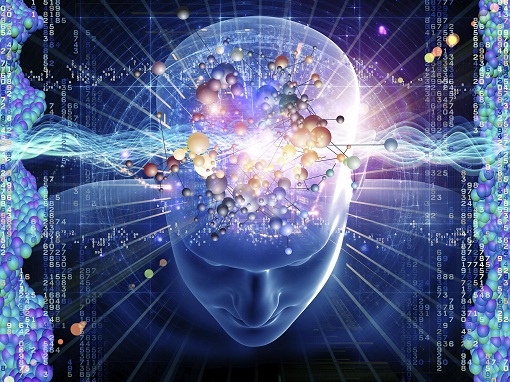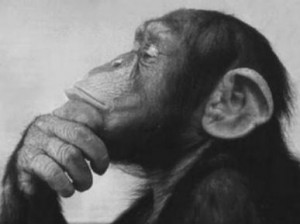
Collage of human head, molecules and various abstract elements on the subject of modern science, chemistry, physics, human and artificial minds
Perhaps the greatest miracle in nature after the creation of the Universe, is the creation of the mind. It is through the mind that the Universe is able to be perceived and be made intelligible. It is through the mind that existence is awakened and affirmed. It is in the mind that the cosmos is spread out, and the world that exists, unfolding itself before us whenever we open our eyes and ears, is inside, in the brain, in the mind. What we perceive; that which we are so sure of to the world around us, is in fact an image, being projected back within us. That so much information is able to be absorbed as reflection, in an upside-down way, digested by the mind and turned the right way up again, analysing it, drawing conclusions about it, and creating physical responses to all that information in the body, all in a microsecond instant, is truly incredible.
We know the mind is in our brain: damage that brain and the processing of reality becomes distorted or even totally incapacitated. The brain is in the world, so the mind is in the world too. But, is it? The world is in space, but the mind defies space. From a mountain top you can open your eyes and look at the horizon: how can that space be enclosed in your mind, in the physical space of your brain?
The reality perceived is not reality, it is just a representation of reality perceived on a certain scale and frequency. In fact, most of reality is unperceived by human sensors and we need reason and technology in order to measure and grasp the kind of reality that our dogs and cats, or the flies buzzing around our faces, can perceive quite naturally.
As for flies: what must the mind of a fly be like? So tiny is the fly’s brain compared to the magnificent super-computer that is the human mind and yet the fly constantly out perceives us. It flaps around our face, darting through the hairs of our legs to suck annoyingly on the liquid oozing out of our pores. Its compound eyes make our lenses-type eyes seem so primitive. How is it that their pin-prick sized brains are capable of processing the Universe in such a way that time moves slower for them? That is why we cannot catch the fly. No matter how fast we try to slap it, it sees the danger coming fly-minutes before the hand reaches it. In the slow-motion universe that the fly inhabits, it always has plenty of time to calmly fly away.
In order to understand where the mind really is, and not fall into the logical trap of concluding that it is outside space, we need to understand the enormous amount of space that exists in the quantum world. In a sense, we, and all living organisms are in the middle of the Universe as far as size goes.
The Universe is 1026 times bigger than us and 10-26 times smaller than us on the quantum scale. We have to multiply 10 with 26 zeroes in order to get to the limits of the Universe, and divide it by 10 with 26 zeroes to reach the space so small that nothing can fit in it.
Perhaps it is that detail that explains how we are capable of seeing all the way to the horizon and projecting it back inside our mind. The reality spread before us is a quantum perception of it within us, and the space within is just as vast, in potential, as the space without.
All outward exploration is an inner one as well.

 Nietzsche called consciousness our most fallible organ
Nietzsche called consciousness our most fallible organ